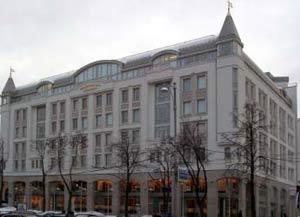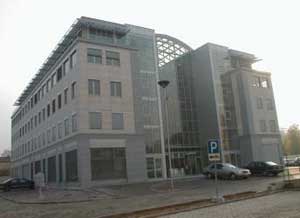
Experience in operating domestic «intelligent buildings».
The author works for a large company engaged in the integrated operation of modern class A and A+ buildings.
These are almost two dozen facilities with a total area of over 30,000 sq. m.
Almost every building is equipped with a set of life support and security systems, which are components of the so-called «intelligent building».
The presence of such systems is a necessary attribute for modern office buildings (A, A+) and shopping and entertainment centers.
 |
 |
| Our projects: Berlin House | Our projects: DaimlerChrysler House |
In this article, I would like to tell you about our company and share our experience in implementing and operating intelligent buildings.
The projects implemented by our company in Russia, starting from 1999, coincided with the time when automatic control systems for engineering equipment of buildings were just beginning to appear.
M+W Zander Facility Management CIS GmbH fulfilled contractual obligations for technical supervision and pre-operational control of projects (including tenders), quality control of project implementation, participated in acceptance tests with subsequent commissioning of facilities.
Our Customers are building owners, large tenants, and companies investing in construction. Our immediate «opponents» in the implementation of projects are large construction companies, general contractors, and subcontractors.
Among them are well-known foreign companies «Skanska», «Enka», «AMR», «Rebau», as well as large Russian organizations.
The word «opponent» perfectly describes our relationship in the process of fulfilling contractual obligations to a common Customer, however, working «for the result», we are, of course, colleagues and our common goal is to create a quality product.
Many projects implemented by M+W Zander Facility Management CIS GmbH can serve as examples of the implementation of the concept of an “intelligent building” for training using various software and hardware, especially since we install equipment from the world's best manufacturers — Siemens, Honeywell, Johnson Controls, TAC, Sauter, EFF-EFF, ESSER, etc.
Our archive has accumulated literally gigabytes of information about various objects both at the stage of working design and in the form of executive documentation.
In fact, it is a large electronic library of technical descriptions and manuals for all software and hardware found in the facilities implemented by our company.
The library materials are actively used by the company's specialists at all stages (operation, technical supervision, construction and engineering consulting, etc.) of working with projects, including intelligent buildings.
By boldly and without quotation marks using the term «intelligent building», we, of course, slightly embellish the real state of affairs that exists in our country.
What is really happening?
By allocating funds for the «intelligence» of a square meter, the investor primarily hopes to receive the following:
1. Greater reliability, efficiency and safety of engineering systems.
2. Creation of more comfortable conditions for tenants and visitors.
3. Reduction in the costs of servicing engineering equipment and optimization of energy costs.
The implementation of automated control systems (ACS) by default brings a certain level of reliability and efficiency to the engineering equipment of buildings, while reducing operating costs.
ACS of life support systems for buildings from Siemens, Johnson Controls, Honeywell, TAC and Sauter are recognized brands both in the Western and our markets (more than 90% of projects).
The current integrator of automated control systems for buildings does not have such a large selection of basic tools for implementing projects, and when choosing a system, the investor does not have to think much about the functional and technical characteristics and cost of the proposed systems, since they all have approximately the same high quality of components and approximately the same cost.
The question is in choosing a specific integrator, in the quality and cost of the services provided (for example, timely and sufficient technical support at the operational stage) and, most importantly, in the quality of the execution of the engineering part of the project, its functional content.
This is where the “domesticity” of the implementation of solutions manifests itself, caused primarily by the specifics of the Russian consumer market and the elementary lack of the necessary experience of integrators.
The situation is significantly complicated if we take into account that in most cases the Customer can hardly imagine by what criteria to evaluate the quality of the product in the conditions of the complete absence of special information and the corresponding regulatory framework.
Today, the «intelligent building» in domestic design looks like this: on the one hand, high-quality components, «bricks» for constructing intelligent buildings in the form of initial software and hardware components from various foreign manufacturers, possessing practically identical characteristics.
On the other hand, insufficient experience and often low qualifications of integrators, superimposed on the complete «darkness» of the end user of the system.
At the same time, even low-skilled specialists on high-quality «bricks» manage to achieve a somewhat acceptable level of automation of projects.
As a result, in most cases, the built systems implement only basic automation and security functions in the minimum acceptable volume, determined not by the design decisions of the contractor, but by the initial characteristics of the selected software and hardware.
The minimum of functions that are initially incorporated into the system components by the manufacturer are implemented.
It is simply impossible to go lower.
The level of automation, not always achieved by minimal means, ultimately provides an answer to the first of the Customer's questions above. Namely, increased reliability, efficiency of the engineering system and the safety of the building as a whole.
However, the implementation of the following two tasks implies a qualitatively different approach to the implementation of systems, which is extremely rare in Russia.
To ensure comfortable conditions, optimize energy consumption, and actually reduce operating costs in a modern building, it is necessary to use as efficiently as possible all the resources embedded by the manufacturer in the supplied software and hardware.
For example, for automation system controllers, this means using all built-in software control algorithms, protective interlocks, and settings such as economizers, separate night and day modes of control and management.
For operator stations, this means fully configured “alarm” subsystems that provide operators with information not only about accidents that have already occurred, but are also capable of issuing warning messages based, for example, on the exhaustion of the established resource of the actuator and, as a result, the implementation of the next maintenance.
SCADA systems must be configured to archive and collect historical data on changes in various parameters, by analyzing which decisions can be made to change equipment operating modes.
Not only control algorithms for directly maintaining certain temperature conditions must be implemented, but also energy-saving algorithms based on automated accounting of energy resources and calendar parameters.
In addition, a modern building has a lot of equipment, the operability of which is critical for the operation of the building, but it is not included in the list of automated «by default» main engineering systems (heat supply, ventilation, refrigeration and water supply).
In reality, we are faced with a number of already implemented domestic solutions, where the implementation of the listed tasks was not carried out and expensive installed equipment is used at a minimum of its capabilities.
If the Customer has purchased an expensive pump with a built-in frequency controller and an interface for connecting to an automation system, and in the project it is connected as an ordinary asynchronous motor with an on-off function, it is not even worth talking about the payback of the equipment.
The above is well illustrated by the still practiced approach to the implementation of central operator stations.
Modern SCADA systems are equipped with numerous functions for displaying process parameters, recording and storing emergency messages, processing and reproducing trends.
In practice, however, minimal means of display and operator control are implemented on mnemonic diagrams. The «alarm» subsystem, as a rule, is not properly configured at all, historical trends are not recorded, and reports are not even mentioned. With such an extremely exaggerated approach to the implementation of the upper level of the system, the effect of implementing the entire system as a whole is minimized.
Thus, practically none of the domestic projects have been implemented as a full-fledged “intelligent building.”
What is the reason that our integrators are in no hurry to eliminate the deficit of experience in terms of creating a truly “intelligent” product with high-quality software and hardware components of automation and security systems?
In our opinion, this is a consequence of the fundamental problem for our market: the discrepancy between the potential capabilities of modern automation and security systems and the consumer level of the Customer of the «smart building».
In fact, the existing capabilities remain potential, and continue to exist beyond the boundaries of implemented projects.
On the one hand, we have learned to sell «golden smart meters», on the other hand, we are unable to discern how this gold glitters, and most importantly, why. This is what determines our low consumer level.
Just as the level of foreign cars is not comparable to the conditions of their operation on our roads.
Russians in general are not at all spoiled by comfortable living conditions.
Our apartments and houses are not equipped with modern climate and ventilation systems.
We have very vague ideas about a truly comfortable environment for life and work.
For comparison: a German company renting office space from our client responds promptly (with complaints to the maintenance service) to temperature changes within 2 degrees from the established 20-22 degrees, while our compatriots are able to work in a wide range of temperatures without making any special claims.
In the West, entire studies have been conducted on the topic of the influence of these 2 degrees on the efficiency of an office worker.
The effect of using energy-saving technologies today is often lower than the cost of saved energy resources, and does not allow for the costs of implementing energy-saving technologies, especially since the real effect can be properly assessed when considering long periods of time.
Today, for most Customers, it is cheaper to spend an extra kilowatt than to calculate and save it.
Our most effective building security element is an additional security officer or elevator operator.
Many are still convinced that it is more economical to organize an additional duty post than to invest in elements of a modern security system.
The cost of a shift technician's salary for the maintenance service often looks more attractive to the Russian Customer than the cost of a qualified solution to a technical problem or equipment upgrade.
Unfortunately, most domestic Customers have not developed the level of requirements necessary for investing in an intelligent building, which leads to extremely low motivation for integrator companies and, accordingly, conditions for developing their professional experience.
This is our reality, which, unfortunately, is a natural brake on the path to creating truly high-quality «intelligent buildings».
Probably, the only way to eliminate such discrepancies is time.
Time during which our country as a whole will rise to such a level of economic development for which an «intelligent building» will become a truly relevant product that meets real needs, and not a common cliché for sale.

Добавить комментарий